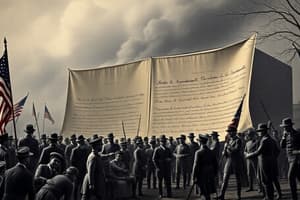Podcast
Questions and Answers
The Thirteenth Amendment abolished ______ and involuntary servitude.
The Thirteenth Amendment abolished ______ and involuntary servitude.
slavery
The Fourteenth Amendment granted full citizenship to all born in the United States, including formerly enslaved ______ Americans.
The Fourteenth Amendment granted full citizenship to all born in the United States, including formerly enslaved ______ Americans.
African
The Fourteenth Amendment ensured that all citizens had the right to 'due process' before being deprived of 'life, liberty, and ______.'
The Fourteenth Amendment ensured that all citizens had the right to 'due process' before being deprived of 'life, liberty, and ______.'
property
The Black Codes passed by southern states restricted black people's right to own property, conduct business, buy and lease land, and move freely through ______ spaces.
The Black Codes passed by southern states restricted black people's right to own property, conduct business, buy and lease land, and move freely through ______ spaces.
The 14th Amendment prohibits any State from depriving any person of life, liberty, or property without due process of ______
The 14th Amendment prohibits any State from depriving any person of life, liberty, or property without due process of ______
The Fifteenth Amendment prohibits discrimination in voting rights on the basis of 'race, color, or previous condition of ______'
The Fifteenth Amendment prohibits discrimination in voting rights on the basis of 'race, color, or previous condition of ______'
From 1867-1877, 16 Black men were elected to Congress, including Senators Hiram Revels and Blanche Kelso Bruce in ______
From 1867-1877, 16 Black men were elected to Congress, including Senators Hiram Revels and Blanche Kelso Bruce in ______
The Jim Crow Era was a period known for racial segregation laws primarily in southern states, focusing on areas of life including marriage/family, education, public accommodations, transportation, and ______.
The Jim Crow Era was a period known for racial segregation laws primarily in southern states, focusing on areas of life including marriage/family, education, public accommodations, transportation, and ______.
Jim Crow laws were enacted in the late 19th and early 20th centuries by white-dominated state legislatures after ______ ended.
Jim Crow laws were enacted in the late 19th and early 20th centuries by white-dominated state legislatures after ______ ended.
Poll taxes were fees one had to pay in order to vote, acting as barriers to people who had just gained the right to vote; they were made unconstitutional by the ______ Amendment in 1964.
Poll taxes were fees one had to pay in order to vote, acting as barriers to people who had just gained the right to vote; they were made unconstitutional by the ______ Amendment in 1964.
Literacy tests were tests administered by white poll workers to discourage or prevent black people from voting; white southerners were generally exempted because of the 'grandfather clause,' which exempted them if their ancestors/grandfathers could vote before the Civil ______.
Literacy tests were tests administered by white poll workers to discourage or prevent black people from voting; white southerners were generally exempted because of the 'grandfather clause,' which exempted them if their ancestors/grandfathers could vote before the Civil ______.
Flashcards are hidden until you start studying




